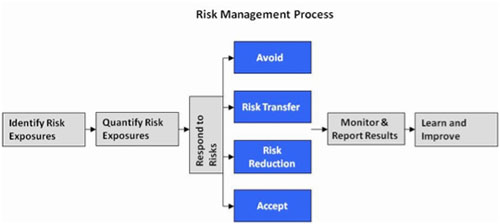Risk management is the process of analyzing exposure to risk and determining how to best handle such exposure. Rensselaer's risk management process undertakes a best practices approach and focuses on understanding the key risks and managing them within acceptable levels. It is a collaborative process where risk response plans are developed in concert with the stakeholders who understand the risks and are best able to manage them.
The following steps outline Rensselaer's approach to risk management:
- Identify the most significant risks arising from operations on an on-going basis.
- Prioritize risks based on the likelihood of occurrence and potential impact.
- Implement strategies to mitigate risks
- Monitor the effectiveness of risk management efforts.

When responding to risks, the institute can use different strategies for managing the risk, including:
- Avoidance – Avoiding the risk by discontinuing the activity that generates it
- Acceptance – Retaining the risk (self-insurance)
- Mitigation – Reducing the likelihood and impact of a risk (loss control programs)
- Transfer – Shifting ownership of risk to a third party (insurance)
All departments seeking to procure goods and services should begin by contacting Rensselaer's Procurement Services department in accordance with the Institute’s Procurement Policies and Procedures.
Overview
Every contract has risks that must be reviewed from the perspective of protecting Rensselaer Polytechnic Institute from financial loss. This section is designed to provide you with guidelines to help manage risk when you, through Procurement Services, need to contract products and services on behalf of Rensselaer. Specifically, our objective is to help the Rensselaer community understand insurance requirements as they relate to different types of contracts.
Procurement Contracts and Rensselaer’s General Terms and Conditions
Rensselaer’s General Terms and Conditions are the Institute’s standard purchase terms and conditions referenced on all Rensselaer purchase orders. These General Terms and Conditions were developed in an attempt to standardize Rensselaer’s approach to supplier contracts. Rensselaer’s General Terms and Conditions are presented to every supplier as part of the procurement process.
Risk Management reviews requisitions for services in OSCAR, Rensselaer’s e-Procurement system, via the “Services – Insurance Required” Special Approver. Risk Management also works closely with Procurement Services to evaluate and mitigate risk on projects before they are submitted in OSCAR as requisitions.
If a supplier accepts the Rensselaer General Terms and Conditions as written and submits requisite proof of insurance, the Special Approval is documented on the requisition and it moves forward in the procurement process.
When a supplier objects to Rensselaer’s General Terms and Conditions, or parts therein, then Procurement Services and Risk Management review the scope of work, the supplier’s requested changes thereto or the supplier’s terms and conditions, and evaluate how best to minimize Institute risk.
Suppliers may try to place greater responsibility for liability claims on Rensselaer in the event of a lawsuit. The Rensselaer General Terms and Conditions provide protection to the Institute by ensuring the responsibility for liability losses is distributed between Rensselaer and the supplier.
The Rensselaer General Terms and Conditions include a specific indemnity provision for suppliers. The clause states that the supplier will indemnify and hold Rensselaer Polytechnic Institute harmless from financial loss arising from claims with respect to any of the goods or services covered by the purchase order.
Other Types of Contracts
In addition to Procurement contracts, Rensselaer reviews the following types of contracts:
- Construction/renovation
- Consulting and professional services
- Commercial lease of premises
- Charter transportation
Risk Management currently reviews these contracts with General Counsel on an ad hoc basis.
Rensselaer maintains a comprehensive program of insurance and self-insurance to address a variety of exposures. The Office of Risk Management is responsible for evaluating loss exposures and arranging appropriate insurance coverage to protect the institute's financial assets.
Insurance is purchased to protect against losses that could have a catastrophic impact on the institute’s operations and financial condition.
Risk Management serves as the institute's primary liaison with brokers and underwriters to ensure appropriate insurance coverages are obtained and renewed when required. Risk Management also serves as an insurance resource for the campus community and provides advice on insurance matters and the management and resolution of insurance claims.
Outside parties frequently ask Rensselaer to confirm various types and levels of insurance in connection with business agreements by requesting certificates of insurance. The Office of Risk Management can provide evidence of the institute’s insurance coverage in the form of a certificate of insurance.
Submit requests for certificates of insurance through the Finance Support Site. Requests for worker's compensation or disability insurance certificates should be sent to the Division of Human Resources.
It is each individual's responsibility to promptly report any accidents, injuries, incidents of concern or damage to property to Risk Management in a timely fashion. In the event of an emergency, call Rensselaer's Public Safety at 518-276-6611 or dial 911.
Institute drivers must report accidents or damage to appropriate the law enforcement, Rensselaer's department of Public Safety, and their supervisor.
Employee injuries must be reported to the Division of Human Resources within 24 hours.
To report a claim, submit through the Finance Support Site.
Rensselaer Property
Property losses are those losses arising from damage or destruction of University equipment, buildings, or assets. Department personnel must take appropriate steps to protect partially damaged property or equipment from further damage. Department personnel are also responsible for providing documentation required by the claims adjuster to establish the extent of any loss or claim.
Property of Faculty, Staff, Students, and Third Parties
Rensselaer is not responsible for the loss of or damage to personal property of its employees, students, visitors, or agents. Individuals are responsible for insuring their own property.
- Faculty and Staff: Rensselaer faculty and staff who bring personal items to campus or to University-sponsored events or trips should remember that they are bringing those items at their own risk. Rensselaer cannot purchase insurance to cover employees' personal property, and it is therefore necessary that all employees cover those items through their personal insurance. Under no condition will the University reimburse employees for personal property brought onto campus or to a campus event or trip.
- Students: Rensselaer students are informed annually of the University’s policy regarding their responsibility for personal property insurance coverage, and are encouraged to purchase renters' insurance or remain on their parents' homeowners' insurance.
